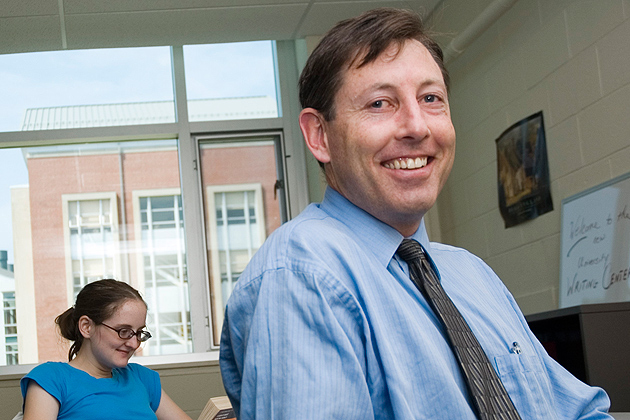
The fastest way to improve your writing might be talking.
At least that’s how improvement begins when you visit the University Writing Center.
The center, established in 2004 by the University Senate, works with students on academic papers, lab reports, personal statements for graduate school applications, freshman writing assignments, senior theses, and even personal writing. They handle assignments due within two hours as well as ones with long term deadlines.
But most of the work required is not done at the center.
“The point is to have a really good conversation about your work,” says Tom Deans, associate professor of English in the College of Liberal Arts and Sciences and director of the center. Not only are students asked to read their work aloud, but also they are asked to clarify the assignment and analyze the audience.
“The writer is in charge of his or her own paper,” he says. “We help you set the agenda for your revision and make sure you have the tools and resources to get it done. The real work happens after you leave.”
Awarded the prestigious national Writing Program Certificate of Excellence for 2010-2011 from the Conference on College Communication and Composition (CCCC), the center is staffed by 25 undergraduate and five graduate tutors.
They are not content experts but rather serious writers from a variety of disciplines. During the 2010-11 academic year, the tutors saw more than 3,100 students.
“We recruit some of the most talented students on campus for our staff,” says Deans. “We can be choosy because we have 10 applicants for every one tutoring spot.”
The center encourages the tutors to do research on writing and tutoring, and several have presented papers at academic conferences or published their findings.
The Writing Center also emphasizes service by offering faculty workshops on writing pedagogy, supporting writing-intensive course instructors across the UConn curriculum, and working with a different local high school each year to set up a peer-tutoring center.
“We mirror in the center what other academic departments do,” says Deans. “We teach, we do research, and we provide public service.”



